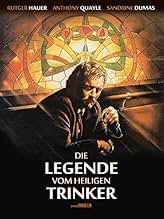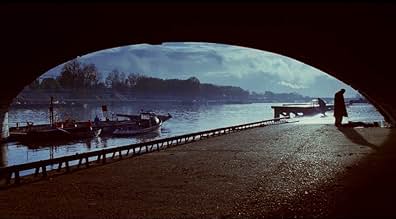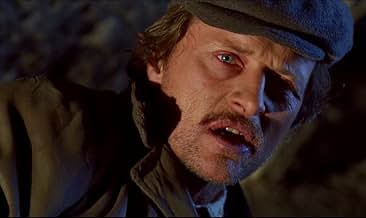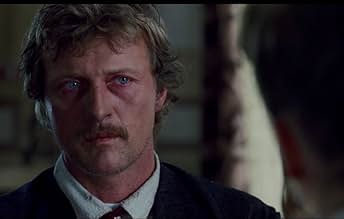IMDb रेटिंग
7.1/10
2.4 हज़ार
आपकी रेटिंग
अपनी भाषा में प्लॉट जोड़ेंAn alcoholic homeless man is given two hundred francs by a stranger, who requests that when he can he will return the money to Saint Therese in the cathedral.An alcoholic homeless man is given two hundred francs by a stranger, who requests that when he can he will return the money to Saint Therese in the cathedral.An alcoholic homeless man is given two hundred francs by a stranger, who requests that when he can he will return the money to Saint Therese in the cathedral.
- निर्देशक
- लेखक
- स्टार
- पुरस्कार
- 12 जीत और कुल 3 नामांकन
Francesco Aldighieri
- Policeman
- (as Franco Aldighieri)
फ़ीचर्ड समीक्षाएं
Takeaway Scene
Rutger Hauer's biggest, joyful smile is for a bathtub.
The Good This is one of very few successful screen transpositions of an introspective literary work. The dialogue is sparse and in two languages but the film while making small adjustments here and there conveys all the internal monologue of Joseph roth's novella. Hauer. Probably his best performance (although I also like his understated character in lady Hawke). He is the icon of a getleman drunk. The photography. natural, unobtrusive, realistic. The cast: A very heterogeneous looking cast that manages to fit in well and act natural in their respective roles. The women: For a very Catholic director, Olmi is very kind to almost the women in the movie, including extras, and they look attractive without losing their real, unpolished authenticit
The Not So Good The film is almost real time,with long contemplative moments, to the point that sometimes the flashbacks have more action that the main scene. For all its photographical and acting beauty, the going can be slow, and watching Hauer drinking one longs to join in. I haven't counted them, but I suspect that matching the movie glass for glass would be lethal (especially the Cafe'-Calva followed by an Absinthe in the morning)
The Strange Hauer is a character living and dressing in the 1930s filmed in 1980s Paris. And it fits seamlessly, the same way that the real, surviving old bistrots and locations fit in their modern surroundings. Olmi has taken advantage of a phenomenon familiar to us all walking in cities and performed a sleight of hand trick, aided by the costume design of Ms. Marchand that emphasizes the continuity between periods to blend characters in.
The Good This is one of very few successful screen transpositions of an introspective literary work. The dialogue is sparse and in two languages but the film while making small adjustments here and there conveys all the internal monologue of Joseph roth's novella. Hauer. Probably his best performance (although I also like his understated character in lady Hawke). He is the icon of a getleman drunk. The photography. natural, unobtrusive, realistic. The cast: A very heterogeneous looking cast that manages to fit in well and act natural in their respective roles. The women: For a very Catholic director, Olmi is very kind to almost the women in the movie, including extras, and they look attractive without losing their real, unpolished authenticit
The Not So Good The film is almost real time,with long contemplative moments, to the point that sometimes the flashbacks have more action that the main scene. For all its photographical and acting beauty, the going can be slow, and watching Hauer drinking one longs to join in. I haven't counted them, but I suspect that matching the movie glass for glass would be lethal (especially the Cafe'-Calva followed by an Absinthe in the morning)
The Strange Hauer is a character living and dressing in the 1930s filmed in 1980s Paris. And it fits seamlessly, the same way that the real, surviving old bistrots and locations fit in their modern surroundings. Olmi has taken advantage of a phenomenon familiar to us all walking in cities and performed a sleight of hand trick, aided by the costume design of Ms. Marchand that emphasizes the continuity between periods to blend characters in.
10duinnuk2
This simple tale is told at a pace which allows the audience time to reflect within the context of the moral challenges it presents. The result is a level of engagement far superior to the gamut of empty sophistication in the movie world. One is able to explore the implications of the actions and decisions of Hauer's character without leaving the narrative - there is no pressure for post viewing reflection when the spell of the film is broken and thought is coloured by a context inappropriate to the narrative. Here is a complete experience - moving, profound and visually beautiful - if only Hollywood could produce cinema of this standard.
Andreas Kartak is one of life's dispossessed: a tramp, whiling away his days on the streets of Paris. One cold morning, a strange, distinguished gentleman offers him 200 francs, under the proviso that Kartak pay the money back- when he can- to Saint Therese in a nearby cathedral. So begins Kartak's quest to restore honor to his soul and meaning to his life by finding a way to return the money- after squandering it on copious amounts of wine and absinthe.
Based on Joseph Roth's posthumously released story of the same name, Ermanno Olmi's 'The Legend of the Holy Drinker' is a quiet, subtle drama that is moving and entertaining in equal measure. Olmi's restrained direction makes for a very interesting viewing experience. The film relies as much on tone and atmosphere as the screenplay- from Olmi and Tullio Kezich- to communicate the narrative and its' themes. The dialogue is sparse, but meaningful; no words are wasted, nor unnecessary speeches made.
The story is simple yet profound. Kartak's quest takes on a spiritual, epic dimension as he struggles to find his way back into society and to keep his pledge to the distinguished stranger. His character is well-rounded and believable, a man of honor thrust into a situation that would turn most dishonourable. He battles with himself and his principles, not to mention his memories of a past life long left behind; often losing those battles and finding solace in a bottle of cava. Kartak is a character many will see aspects of themselves in: a fascinating, flawed and thoroughly real creation.
The film is beautiful in terms of visuals. Dante Spinotti's cinematography has a rhythmic, mythical quality to it that suits the narrative perfectly. He captures the stark, cold charm of the Parisian streets with real verve and style. Gianni Quaranta's production design is striking and timeless. The film looks like it is set in the thirties, though the time period is never made definitive. His work is rich in detail and adds another dimension of authenticity to the proceedings. The same can be said for Jean-Jacques Caziot and Philippe Turlure's naturalistic set decoration and the inspired costume design from Anne-Marie Marchand.
Rutger Hauer stars as Kartak, delivering a moving, understated performance that is one of the finest he ever gave. His Kartak is a vulnerable man for whom honor and dignity mean the world, though his alcoholism has overtaken his principles. Hauer disappears into the character so thoroughly you genuinely forget you're watching an actor on screen.
Hauer was a performer of great versatility, intelligence and depth- not to mention charm- and he demonstrates that fact here. Though he will likely largely be remembered for his similarly powerful performance as Roy Batty in 'Blade Runner', his work as Kartak is truly magnificent and unaffectedly profound.
The supporting cast deliver generally admirable performances, with Anthony Quayle's as the distinguished stranger being a standout. He brings to the role the right amount of dignity and mystery that leaves an ineradicable impression on the viewer. Joseph De Medina also does good work as an obese hustler Kartak encounters, and Sandrine Dumas is utterly charming as Gaby, something of a love interest for Kartak; but poor post-dubbing of many of these secondary players diminishes the power of their performances, while also lessening the impact of their scenes.
'The Legend of the Holy Drinker' is an affecting film that tells a deceptively simple tale masterfully. As a character study, it works wonderfully, with Rutger Hauer delivering what could arguably be called the finest performance of his career. Director Ermanno Olmi has brought to audiences a memorable, thoughtful film that will surely be beloved by any who care to give it their time. Joseph Roth's stories are notoriously difficult to bring to the screen; this is easily the best adaptation of his work to date. 'The Legend of the Holy Drinker' is quiet, clever and utterly compelling.
Based on Joseph Roth's posthumously released story of the same name, Ermanno Olmi's 'The Legend of the Holy Drinker' is a quiet, subtle drama that is moving and entertaining in equal measure. Olmi's restrained direction makes for a very interesting viewing experience. The film relies as much on tone and atmosphere as the screenplay- from Olmi and Tullio Kezich- to communicate the narrative and its' themes. The dialogue is sparse, but meaningful; no words are wasted, nor unnecessary speeches made.
The story is simple yet profound. Kartak's quest takes on a spiritual, epic dimension as he struggles to find his way back into society and to keep his pledge to the distinguished stranger. His character is well-rounded and believable, a man of honor thrust into a situation that would turn most dishonourable. He battles with himself and his principles, not to mention his memories of a past life long left behind; often losing those battles and finding solace in a bottle of cava. Kartak is a character many will see aspects of themselves in: a fascinating, flawed and thoroughly real creation.
The film is beautiful in terms of visuals. Dante Spinotti's cinematography has a rhythmic, mythical quality to it that suits the narrative perfectly. He captures the stark, cold charm of the Parisian streets with real verve and style. Gianni Quaranta's production design is striking and timeless. The film looks like it is set in the thirties, though the time period is never made definitive. His work is rich in detail and adds another dimension of authenticity to the proceedings. The same can be said for Jean-Jacques Caziot and Philippe Turlure's naturalistic set decoration and the inspired costume design from Anne-Marie Marchand.
Rutger Hauer stars as Kartak, delivering a moving, understated performance that is one of the finest he ever gave. His Kartak is a vulnerable man for whom honor and dignity mean the world, though his alcoholism has overtaken his principles. Hauer disappears into the character so thoroughly you genuinely forget you're watching an actor on screen.
Hauer was a performer of great versatility, intelligence and depth- not to mention charm- and he demonstrates that fact here. Though he will likely largely be remembered for his similarly powerful performance as Roy Batty in 'Blade Runner', his work as Kartak is truly magnificent and unaffectedly profound.
The supporting cast deliver generally admirable performances, with Anthony Quayle's as the distinguished stranger being a standout. He brings to the role the right amount of dignity and mystery that leaves an ineradicable impression on the viewer. Joseph De Medina also does good work as an obese hustler Kartak encounters, and Sandrine Dumas is utterly charming as Gaby, something of a love interest for Kartak; but poor post-dubbing of many of these secondary players diminishes the power of their performances, while also lessening the impact of their scenes.
'The Legend of the Holy Drinker' is an affecting film that tells a deceptively simple tale masterfully. As a character study, it works wonderfully, with Rutger Hauer delivering what could arguably be called the finest performance of his career. Director Ermanno Olmi has brought to audiences a memorable, thoughtful film that will surely be beloved by any who care to give it their time. Joseph Roth's stories are notoriously difficult to bring to the screen; this is easily the best adaptation of his work to date. 'The Legend of the Holy Drinker' is quiet, clever and utterly compelling.
This tale of a tramp who is the recipient of the milk of human kindness but who finds it difficult to repay the goodness shown to him is typical of its director, Ermanno Olmi, but whereas other Olmi films deal with the common-place with an uncommon beauty this tale of the mystical is overtly simplistic. "The Legend of the Holy Drinker" is visually superb and we should expect nothing less from an Olmi picture but it is also very dry, very dull and very unevenly acted, (the partial dubbing of its international cast certainly doesn't help).
As the tramp Rutger Hauer staggers around looking a little too bewildered at what's happening to him and the supporting cast are fundamentally just bit players in his far from interesting story. The Stravinsky score also sits somewhat uneasily on proceedings. Some people think this is a masterpiece while others have simply dismissed it. Personally I found it a crashing bore.
As the tramp Rutger Hauer staggers around looking a little too bewildered at what's happening to him and the supporting cast are fundamentally just bit players in his far from interesting story. The Stravinsky score also sits somewhat uneasily on proceedings. Some people think this is a masterpiece while others have simply dismissed it. Personally I found it a crashing bore.
Olmi is one of Europe's last Old Masters in the art of film making. He is usually regarded as a belated neo-realist, but after you've seen "The Legend of the Holy Drinker", you will realize the label simply does not stick. This is a film about spirituality, about communion, one of the most deeply religious movies ever, whose only rivals might be Dreyer's "Ordet" or Bergman's rather pretentious "faith trilogy" ("Through a Glass Darkly", "Winter Light" and "The Silence"). However, you will not find Scandinavian mists or angst in Catholic Olmi's adaptation of the beautiful novella written, oddly enough, by a great Jewish novelist, Joseph Roth. Wine is a metaphor for life, and Paris is a metaphor for our urban world. In this symbolic universe, it takes a great actor to give flesh and blood to the character of Andreas, the holy drinker, a beggar endowed with an amazing sense of dignity. Rutger Hauer was the man for the job: this was his best performance: he was never better, and, to judge from the course his career has taken, I fear he will never be better than in this film. It is not a thriller, but it is thrilling. It takes its own leisurely pace, but goes very far, very deep indeed into the human soul. After so many insipid or unpalatable cinematic concoctions, treat yourself to this film: it truly is vintage stuff.
क्या आपको पता है
- ट्रिवियाRobert De Niro was approached for the role of Andreas Kartak, but he turned down the offer because he was not convinced about the project.
- क्रेज़ी क्रेडिट"May God grant all of us, the drinkers, such a light and beautiful death". (Joseph Roth)
- कनेक्शनFeatured in Het uur van de wolf: Rutger Hauer: Blond, blue eyes (2006)
टॉप पसंद
रेटिंग देने के लिए साइन-इन करें और वैयक्तिकृत सुझावों के लिए वॉचलिस्ट करें
- How long is The Legend of the Holy Drinker?Alexa द्वारा संचालित
विवरण
- रिलीज़ की तारीख़
- कंट्री ऑफ़ ओरिजिन
- भाषाएं
- इस रूप में भी जाना जाता है
- The Legend of the Holy Drinker
- फ़िल्माने की जगहें
- उत्पादन कंपनियां
- IMDbPro पर और कंपनी क्रेडिट देखें
बॉक्स ऑफ़िस
- दुनिया भर में सकल
- $6,384
- चलने की अवधि
- 2 घं 8 मि(128 min)
- रंग
- ध्वनि मिश्रण
- पक्ष अनुपात
- 1.85 : 1
इस पेज में योगदान दें
किसी बदलाव का सुझाव दें या अनुपलब्ध कॉन्टेंट जोड़ें























